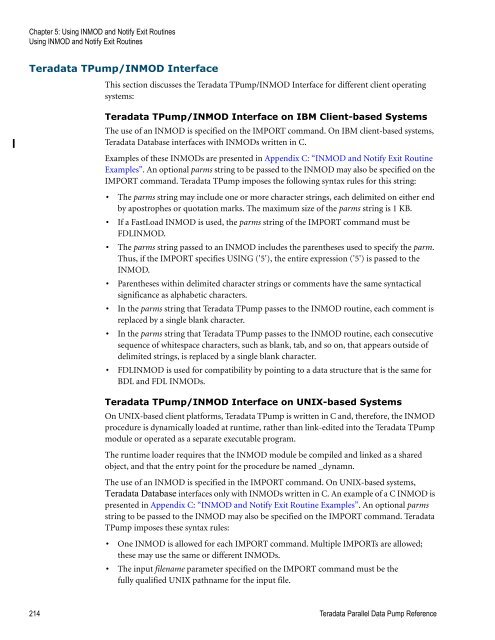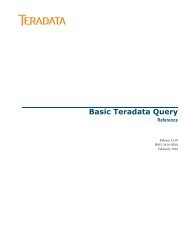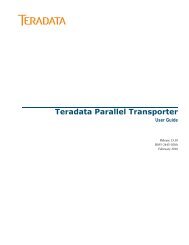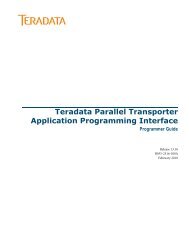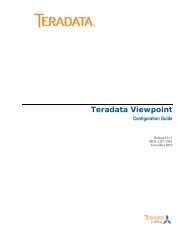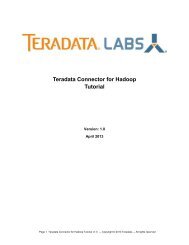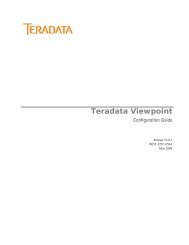Teradata Parallel Data Pump
Teradata Parallel Data Pump Reference - Teradata Developer ...
Teradata Parallel Data Pump Reference - Teradata Developer ...
- No tags were found...
Create successful ePaper yourself
Turn your PDF publications into a flip-book with our unique Google optimized e-Paper software.
Chapter 5: Using INMOD and Notify Exit Routines<br />
Using INMOD and Notify Exit Routines<br />
<strong>Teradata</strong> T<strong>Pump</strong>/INMOD Interface<br />
This section discusses the <strong>Teradata</strong> T<strong>Pump</strong>/INMOD Interface for different client operating<br />
systems:<br />
<strong>Teradata</strong> T<strong>Pump</strong>/INMOD Interface on IBM Client-based Systems<br />
The use of an INMOD is specified on the IMPORT command. On IBM client-based systems,<br />
<strong>Teradata</strong> <strong>Data</strong>base interfaces with INMODs written in C.<br />
Examples of these INMODs are presented in Appendix C: “INMOD and Notify Exit Routine<br />
Examples”. An optional parms string to be passed to the INMOD may also be specified on the<br />
IMPORT command. <strong>Teradata</strong> T<strong>Pump</strong> imposes the following syntax rules for this string:<br />
• The parms string may include one or more character strings, each delimited on either end<br />
by apostrophes or quotation marks. The maximum size of the parms string is 1 KB.<br />
• If a FastLoad INMOD is used, the parms string of the IMPORT command must be<br />
FDLINMOD.<br />
• The parms string passed to an INMOD includes the parentheses used to specify the parm.<br />
Thus, if the IMPORT specifies USING ('5'), the entire expression ('5') is passed to the<br />
INMOD.<br />
• Parentheses within delimited character strings or comments have the same syntactical<br />
significance as alphabetic characters.<br />
• In the parms string that <strong>Teradata</strong> T<strong>Pump</strong> passes to the INMOD routine, each comment is<br />
replaced by a single blank character.<br />
• In the parms string that <strong>Teradata</strong> T<strong>Pump</strong> passes to the INMOD routine, each consecutive<br />
sequence of whitespace characters, such as blank, tab, and so on, that appears outside of<br />
delimited strings, is replaced by a single blank character.<br />
• FDLINMOD is used for compatibility by pointing to a data structure that is the same for<br />
BDL and FDL INMODs.<br />
<strong>Teradata</strong> T<strong>Pump</strong>/INMOD Interface on UNIX-based Systems<br />
On UNIX-based client platforms, <strong>Teradata</strong> T<strong>Pump</strong> is written in C and, therefore, the INMOD<br />
procedure is dynamically loaded at runtime, rather than link-edited into the <strong>Teradata</strong> T<strong>Pump</strong><br />
module or operated as a separate executable program.<br />
The runtime loader requires that the INMOD module be compiled and linked as a shared<br />
object, and that the entry point for the procedure be named _dynamn.<br />
The use of an INMOD is specified in the IMPORT command. On UNIX-based systems,<br />
<strong>Teradata</strong> <strong>Data</strong>base interfaces only with INMODs written in C. An example of a C INMOD is<br />
presented in Appendix C: “INMOD and Notify Exit Routine Examples”. An optional parms<br />
string to be passed to the INMOD may also be specified on the IMPORT command. <strong>Teradata</strong><br />
T<strong>Pump</strong> imposes these syntax rules:<br />
• One INMOD is allowed for each IMPORT command. Multiple IMPORTs are allowed;<br />
these may use the same or different INMODs.<br />
• The input filename parameter specified on the IMPORT command must be the<br />
fully qualified UNIX pathname for the input file.<br />
214 <strong>Teradata</strong> <strong>Parallel</strong> <strong>Data</strong> <strong>Pump</strong> Reference


